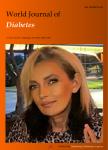Topical application of platelet-rich plasma for diabetic foot ulcers: a systematic review
Topical application of platelet-rich plasma for diabetic foot ulcers: a systematic review作者机构:Department of Orthopaedic Surgery Houston Methodist Hospital Department of Plastic and Reconstructive Surgery University of Texas Medical Branch Department of Medicine Pulmonary Critical Care and Sleep Medicine Texas A and M University Department of Anesthesiology and Critical Care Houston Methodist Hospital
出 版 物:《World Journal of Diabetes》 (世界糖尿病杂志(英文版)(电子版))
年 卷 期:2018年第9卷第10期
页 面:172-179页
核心收录:
学科分类:10[医学]
主 题:Platelet rich plasma Diabetes Foot Ulcer Wound
摘 要:AIM To determine if topical application of platelet-rich plasma(PRP) to diabetic foot ulcers(DFUs) results in superior healing rates. METHODS A systematic review was registered with PROSPERO and performed using PRISMA guidelines. Level Ⅰ-Ⅳ investigations of topical PRP application in DFUs were sought in multiple databases including: MEDLINE, Web of Science, and Cochrane Central Register of Controlled Trials. The search terms used were platelet rich plasma, diabetes, ulcers, and wound. The Modified Coleman Methodology Score(MCMS) was used to analyze study methodological quality. Study heterogeneity and a mostly non-comparative nature of evidence precluded meta-analysis. Only the outcome measurements used by more than 50% of the studies were included in the data synthesis to increase power of the measurement over that of individual studies. A weighted mean of healing rate per week between PRP group vs controls were compared using two-sample z-tests using P-value of less than 0.05 for *** One thousand two hundred and seventeen articles were screened. Eleven articles(322 PRP subjects, 126 controls, PRP subject mean age 58.4 ± 7.2 years, control mean age 58.7 ± 5.9 years) were analyzed. Six articles were level Ⅱ evidence, four were level Ⅲ, and one article was level Ⅳ. The mean MCMS was 61.8 ± 7.3. Healing rate was significantly faster with PRP application compared to controls(0.68 ± 0.56 cm2/wk vs 0.39 ± 0.09 cm2/wk; P 90% of the original ulcer area was 7.8 ± 2.7 wk and 8.3 ± 3.7 wk for patients in the PRP group and control groups, respectively(P = 0.115). There were significantly lower adverse effects reported with PRP application compared to controls(7 wound infections, 1 contact dermatitis vs 14 wound infections, 1 maceration; P 0.001).CONCLUSION The topical application of PRP for DFUs results in statistically superior healing rates and lower complication rates compared to controls.



